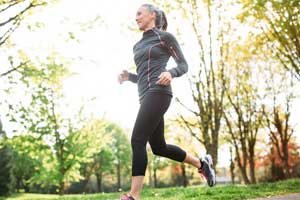- Home
- Editorial
- News
- Practice Guidelines
- Anesthesiology Guidelines
- Cancer Guidelines
- Cardiac Sciences Guidelines
- Critical Care Guidelines
- Dentistry Guidelines
- Dermatology Guidelines
- Diabetes and Endo Guidelines
- Diagnostics Guidelines
- ENT Guidelines
- Featured Practice Guidelines
- Gastroenterology Guidelines
- Geriatrics Guidelines
- Medicine Guidelines
- Nephrology Guidelines
- Neurosciences Guidelines
- Obs and Gynae Guidelines
- Ophthalmology Guidelines
- Orthopaedics Guidelines
- Paediatrics Guidelines
- Psychiatry Guidelines
- Pulmonology Guidelines
- Radiology Guidelines
- Surgery Guidelines
- Urology Guidelines
Exercise may reverse negative health effects of menopause

The study published in the journal European Journal of Applied Physiology has found that indulging in three-times-a-week of exercise in form of sprinting for over two months improves cardiovascular function and aerobic fitness in postmenopausal women who are overweight.
Menopause is the process through which a woman ceases to be fertile or menstruate. It is accompanied by decreased aerobic fitness and increased risk of cardiovascular disease. For the majority of menopausal women who are overweight and don't exercise, menopause is accompanied by a decrease in muscle mass and aerobic fitness and an increase in fat mass, which contributes to the increased rates of type 2 diabetes in postmenopausal women.
Yati Boutcher, School of Medical Sciences, Faculty of Medicine, University of New South Wales, Sydney, Australia, and colleagues conducted the study to determine the effect of an 8-week sprint interval training (SIT) program on the cardiovascular function and aerobic fitness of overweight postmenopausal women.
SIT is a time-efficient intervention for improving cardiovascular function and aerobic fitness of young adults. In this study, the SIT program involved three SIT sessions a week for 8 weeks. Each session consisted of 20 min of 8-s sprints and 12 s of light pedaling.
The study included thirty overweight postmenopausal women. 15 of them were randomized to exercise and 15 formed the control group. Participants also completed 8 min of light aerobic cycle exercise, before and after the SIT intervention. Cardiovascular function including heart rate, stroke volume (SV), and diastolic filling time (DFT) was assessed before and after the intervention and during 8 min of light aerobic exercise. Estimated maximal oxygen uptake (V˙O2maxV˙O2max) was also assessed.
Also Read: Exercise in no way impacts onset of Menopause
Key findings:
- Resting SV was increased from pre- (77.5 ± 17.0 mL) to post-SIT (81.3 ± 17.0 mL), whereas SV during 8 min of light aerobic exercise was increased, from pre- (97.8 ± 1.6 mL) to post-test (103.5 ± 17.8 mL).
- Resting DFT was increased, at pre- (333.4 ± 94.4 mL) to post-SIT (357.4 ± 88.2 mL), whereas DFT during 8 min of aerobic exercise was increased, from pre- (480.1 ± 99.5 mL) to posttest (527.2 ± 123.0 mL).
- Predicted V˙O2maxV˙O2max was increased, from pre- (19.5 ± 5.87 mL kg−1 min−1) to post-SIT (21.4 ± 7.02 mL kg−1 min−1).
Also Read: Consumption of diet rich in fruits and vegetables lowers menopause symptoms
Women who participated in the exercise intervention group added 0.7 kg of muscle to their legs and trunk and lost 0.4 kg of body fat. They increased their aerobic fitness by 12%.
“The increase in muscle mass after 8 hours of sprinting equates to an 86-gram gain per hour of sprint exercise,” said Boutcher, “This compares favourably to the effect of weight training, which in postmenopausal women has typically shown a 40g gain in muscle mass per hour.”
For detailed study log on to https://doi.org/10.1007/s00421-019-04087-9

Disclaimer: This site is primarily intended for healthcare professionals. Any content/information on this website does not replace the advice of medical and/or health professionals and should not be construed as medical/diagnostic advice/endorsement or prescription. Use of this site is subject to our terms of use, privacy policy, advertisement policy. © 2020 Minerva Medical Treatment Pvt Ltd